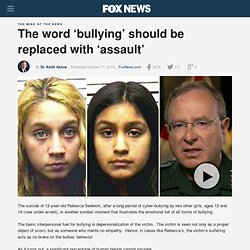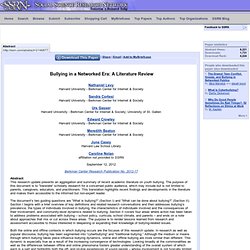

The word ‘bullying’ should be replaced with ‘assault’ The suicide of 12-year-old Rebecca Sedwick, after a long period of cyber-bullying by two other girls, ages 12 and 14 (now under arrest), is another somber moment that illustrates the emotional toll of all forms of bullying.

The basic interpersonal fuel for bullying is depersonalization of the victim. The victim is seen not only as a proper object of scorn, but as someone who merits no empathy. Hence, in cases like Rebecca’s, the victim’s suffering acts as no brake on the bullies’ behavior. As it turns out, a significant percentage of human beings cannot insulate themselves psychologically from chronic, mean-spirited criticism, taunting and threats of being marginalized socially. This depersonalization focused on them can lead them to feel helpless, hopeless and desperate to end their pain, even if that means ending their lives.
We are social creatures. The word "bullying" should probably be dropped from our lexicon. Dr. Be Aware: The Dangers of Food Allergy Bullying. Let's be honest: raising children and teens isn't easy.

As parents, we come to many forks in the road when deciding how to react to specific situations with our kids. No matter the parenting style -- laid-back, nurturing, authoritarian, over-bearing, or (likely) a fusion of multiple approaches -- whichever direction you take is influenced by past experience when you've had to cope with and support your child through issues he or she has faced. I began to see stories recently, this summer in particular, about children in middle schools and high schools bullying other students that have food allergies, and I was taken aback.
If my child had severe food allergies, how would I deal with this kind of problem? All forms of bullying -- on social media, school grounds, or in the workplace -- follow the same model; the perpetrator has a thirst to elevate his or her status over the victim. (Nut-Free Zone sign courtesy of MySafetySign.) I'm aware that this isn't a brand new phenomenon. Schoolgirl, 14, in suspected suicide after being told to 'go and drink bleach' by bullies on website Ask.fm.
Schoolgirl Hannah Smith from Lutterworth was found dead on Friday People had been leaving her messages like: 'Die' and 'Go get cancer' Her parents and friends are calling for Ask.fm to be banned completely Controversial site, based in Latvia, allows people to post anonymously By Martin Robinson PUBLISHED: 14:59 GMT, 5 August 2013 | UPDATED: 21:49 GMT, 5 August 2013 Victim: Hannah Smith, 14, has killed herself after being bullied by anonymous trolls online A 14-year-old schoolgirl killed herself after being bullied by online trolls who told her to 'drink bleach' and 'go get cancer'.
Hannah Smith, from Lutterworth, Leicestershire, was found dead on Friday after being sent abusive messages on controversial website Ask.fm. After a barrage of abuse Hannah posted the handwritten message: 'You think you want to die but in reality you just want to be saved' on the day before she died. 'Wats left after hannah took here own life. 'Me and jo sleep down stairs now - we dont have a bed time. TV Anchor Gets Called Fat, Has an Awesome Response. An anchor for a CBS affiliate in LaCrosse, Wisc., took what could have been a hurtful comment from a viewer and turned it into a powerful tirade against online bullying.

Jennifer Livingston of WKBT-TV read a letter from a viewer who took issue with the fact that she is overweight. "Obesity is one of the worst choices a person can make and one of the most dangerous habits to maintain," the viewer wrote. "I leave you this note hoping that you'll reconsider your responsibility as a local public personality to present and promote a healthy lifestyle. " Livingston's husband, fellow WKBT anchor Mike Thompson, posted the emailed letter on his Facebook Page and received an outpouring of support.
Emboldened by this, Livingston singled the writer out as a bully. She continued: "We are better than that bully. What do you think? Bullying in a Networked Era: A Literature Review by Nathaniel Levy, Sandra Cortesi, Urs Gasser, Edward Crowley, Meredith Beaton, June Casey, Caroline Nolan. This research update presents an aggregation and summary of recent academic literature on youth bullying.

The purpose of this document is to “translate” scholarly research for a concerned public audience, which may include but is not limited to parents, caregivers, educators, and practitioners. This translation highlights recent findings and developments in the literature and makes them accessible to the informed but non-expert reader. The document’s two guiding questions are “What is bullying?” (Section I) and “What can be done about bullying?” (Section II). Both the online and offline contexts in which bullying occurs are the focuses of this research update.